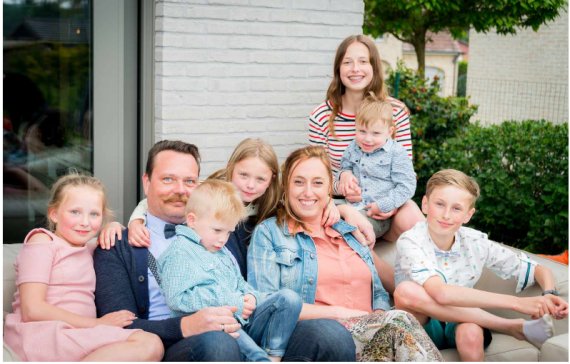- Providing care and support for elderly family members who may require assistance with daily tasks
- Sharing the financial burden of healthcare and other expenses related to eldercare
- Offering emotional support and companionship to elderly family members
- Allowing elderly family members to age in place within the comfort and familiarity of their own home.
Vai trò của extended families trong chăm sóc trẻ em:
- Providing additional support and resources for parents in raising children
- Sharing childcare responsibilities, such as pick-up and drop-off, cooking, and cleaning
- Offering emotional support and guidance to children
- Passing down cultural traditions and values to the younger generation
Impact of modernization on extended families
Theo thời gian, hình thức chung sống theo kiểu extended families cũng dần trở nên ít hơn do sự thay đổi của kinh tế, xã hội và đặc biệt là các tác động của hiện đại hóa như:
- Increased urbanization and migration have led to extended families living farther apart from each other, making it more difficult to provide childcare and eldercare support.
- The rise of individualism in modern societies has weakened the traditional emphasis on family obligation and interdependence, which may diminish the importance of extended families.
- The availability of social welfare programs, such as retirement benefits and childcare subsidies, may reduce the need for extended families to provide support for their elderly and young members.
- Technological advancements, such as smartphones and video calls, have made it easier for extended families to stay connected despite geographic distances.
- Modern lifestyles, such as dual-income households and longer work hours, may make it challenging for extended families to coordinate caregiving responsibilities and maintain regular communication.
- The pressure to pursue educational and career opportunities may lead younger generations to prioritize individual aspirations over family obligations, which could further weaken the extended family structure.
- Some argue that modernization has contributed to the fragmentation of extended families and the breakdown of traditional social support networks, leading to social isolation and loneliness for some individuals.
How extended families demonstrate affection and create a sense of security for their members?
Sự khác biệt giữa tuổi tác, học thức sẽ là những khó khăn lớn nếu đối với kiểu extended families. Vì vậy, để có thể chung sống cùng nhau, các thành viên trong gia đình cần biết cách thể hiện tình cảm và tạo cảm giác an toàn cho các thành viên. Dưới đây là một số cách mà các extended families thường làm:
- Regular gatherings
- Showing support and care for one another
- Sharing responsibilities
- Providing financial and emotional support
- Passing on family traditions and values.
How to increase connections within extended families?
Cuối cùng, bạn có thể chia sẻ cho người nghe cách để kết nối các thành viên trong extended families lại với nhau:
- Schedule regular family gatherings: By setting aside time for family members to come together and spend quality time, you can strengthen family bonds and create lasting memories.
- Encourage open communication: Open and honest communication is key to building strong relationships. Encourage family members to share their thoughts and feelings with each other, and make an effort to actively listen and show empathy.
- Share family traditions: Sharing family traditions, whether it’s cooking a special dish or celebrating holidays in a certain way, can help foster a sense of belonging and connection within the family.
- Get involved in each other’s lives: Show support and interest in each other’s lives by attending important events, helping out during times of need, or simply staying in touch regularly.
- Embrace diversity and differences: Extended families often include members from different backgrounds, ages, and lifestyles. Embracing these differences can help create a more accepting and inclusive family environment.
Bài mẫu chủ đề talk about extended family
Bài mẫu 1
Extended family refers to a family structure that includes not only parents and children, but also grandparents, aunts, uncles, cousins, and other relatives living together or in close proximity. This type of family structure is found in many cultures around the world and can have both positive and negative effects on family members.
One of the most significant benefits of an extended family is the sense of support and belonging it can provide. With more family members around, individuals are more likely to have access to emotional and practical support when they need it. Extended families also tend to place a strong emphasis on maintaining family traditions and cultural values, which can help individuals develop a stronger sense of identity and purpose.
However, there can also be challenges associated with extended families. For example, conflicts between family members can arise more easily when there are more people living together. There can also be differences in opinion regarding how children should be raised, which can lead to tension between family members. In addition, extended families may struggle to balance the needs of different generations, such as caring for both young children and elderly relatives.
Despite these challenges, many people find that extended families are a valuable source of support and companionship. To make the most of these relationships, it is important to foster open communication and positive relationships within the family. This can involve spending quality time together, sharing meals, and engaging in activities that everyone enjoys. By doing so, extended families can strengthen their bonds and create a sense of unity that can last for generations.
Bài mẫu 2
Nowadays, it is becoming more common for individuals or nuclear families to live separately, rather than with extended family members. However, in my opinion, living in an extended family can offer many advantages.
On the one hand, nuclear families can provide benefits such as more focused attention from parents and reduced household expenses. With fewer family members, parents can spend more time teaching and guiding their children, which can positively impact their development. Additionally, with fewer people to support, parents may have more financial resources to invest in things like education and healthcare.
On the other hand, extended families can offer many advantages as well. For example, in times of need, there will always be someone available to help. When facing a financial burden or other difficult situation, other family members can provide support and assistance.
Additionally, living with extended family members provides the opportunity to build stronger relationships and spend more quality time together. In some cases, extended families may also pool their resources to help each other financially, which can reduce individual financial burdens.
In conclusion, while nuclear families can offer some benefits, I believe that living in an extended family can be a better option for many people. The support and sense of community that come with living in a large family group can be valuable and help individuals to feel more comfortable and secure in their daily lives.
Bài mẫu 3
Extended families have been a traditional way of living in many cultures around the world. It refers to a family structure that includes grandparents, parents, children, and sometimes even aunts, uncles, and cousins living together under one roof or in close proximity.
One of the most significant advantages of extended families is that they provide a strong support system for their members. The grandparents can help take care of the children while the parents are at work, or assist in managing the household. They also offer emotional support during difficult times, such as illnesses or financial struggles. In many cultures, it is expected that adult children take care of their aging parents, and living together in an extended family allows for easier eldercare.
Another advantage of living in an extended family is that it creates a sense of community and belonging. With so many family members living together, there are always people to talk to, spend time with, and celebrate important events. Children grow up with a strong sense of family identity and are surrounded by a network of supportive adults.
However, living in an extended family is not without its challenges. Conflicts can arise when different generations have different opinions on how to raise children, manage finances, or make decisions. There can also be issues related to privacy and personal space, as living in close quarters with so many people can be overwhelming.
In conclusion, while extended families have their pros and cons, they continue to be an important part of many cultures. For those who value a strong support system and a sense of community, living in an extended family can be a fulfilling and rewarding experience.
Xem thêm các tài liệu Tiếng Anh hay, chi tiết khác:
- Talk about your favorite food | Bài mẫu IELTS Speaking Part 2, 3
- Talk about global warming | Bài mẫu IELTS Speaking Part 1, 2, 3
- Talk about your hometown | Bài mẫu IELTS Speaking Part 1, 2, 3
- Talk about your hobby | Bài mẫu IELTS Speaking Part 1, 2
- Talk about lifestyle | Bài mẫu IELTS Speaking 1, 2, 3
TOP Việc làm "HOT" dành cho sinh viên:





